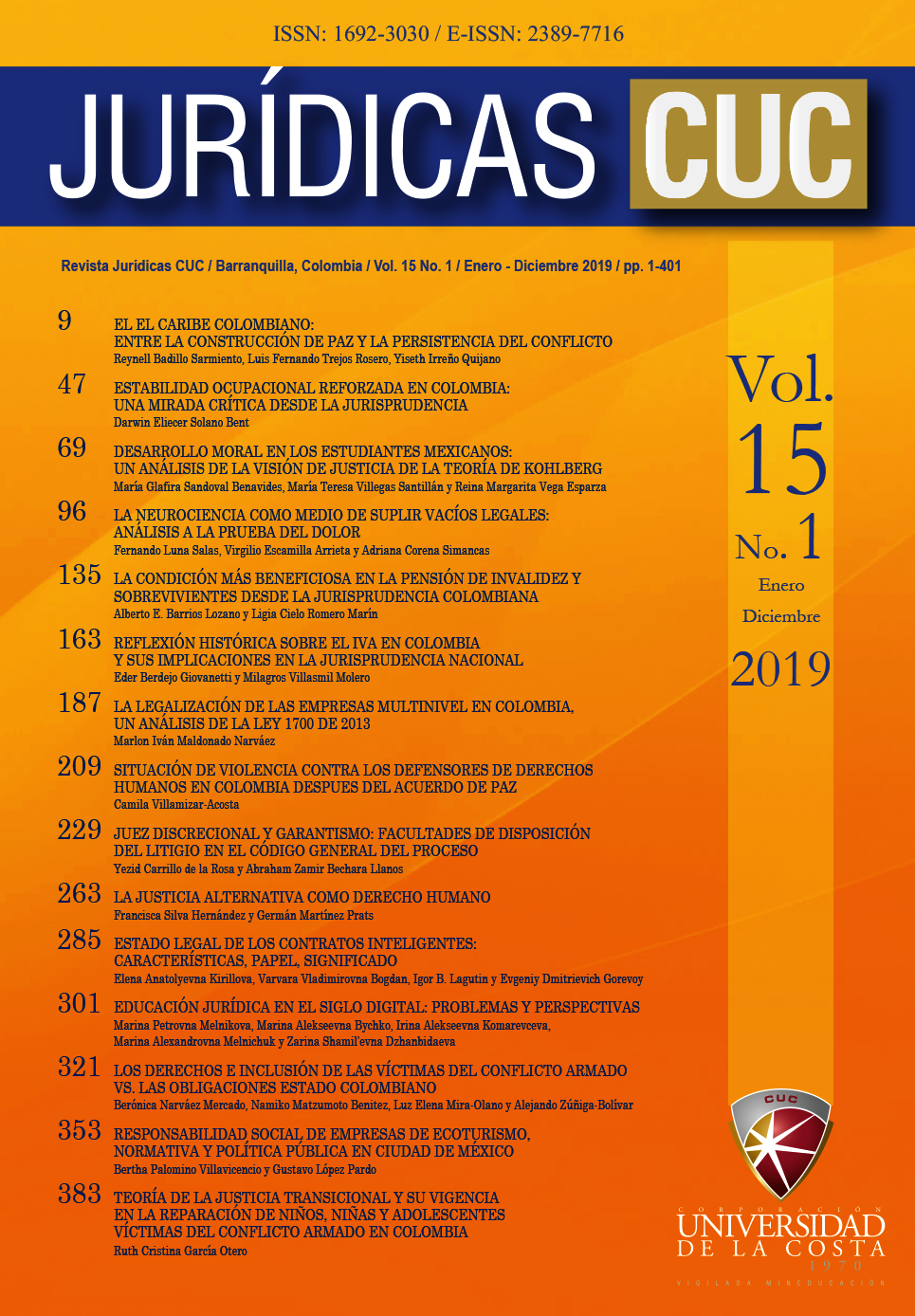Legal education in the digital age: problems and prospects
DOI:
https://doi.org/10.17981/juridcuc.15.1.2019.12Keywords:
distance learning, e-learning, legal education, pedagogical technologies, digital technologiesAbstract
The purpose of this article is the analysis of Information and Communication Technologies - ICT in legal education according to the reform of the Russian national education system. It is observed how the creation of digital education in Russia contributes to its integration into the global educational environment. The regulatory framework for analysing ICTs in legal education, e-learning and distance education is used as a starting point. A critical analysis methodology is used to model the possible implementation of problem-based learning using ICT and using the "contract builder" simulator as an example. It is concluded that the introduction of ICT in the educational process requires a systematic approach, a state policy for the development of this area, additional funding and training of teachers.
Downloads
References
Bichko, M. (2019). Webinar microfinance. [Online]. Retrieved from: http://finedu-skfo.ru/
Bolkunov, I. A. (2016). E-learning: problems, prospects, tasks. Tavricheskiy scientific observer, 11(16). Retrieved from: https://cyberleninka.ru
Ektov, A. V. (2017). On the issue of assessing the professional competencies of bachelors of jurisprudence in the conditions of distance learning. Pedagogical education in Russia, 4, 87−94.
European Ministers of Education. (19 june, 1999). Joint Statement by European Ministers of Education. [Bologna Declaration]. Retrieved from: http://base.garant.ru/2564382/
Galyaev, V. N. and Zasanova, Z. A. (2012). On the classification of distance learning models. Higher education in Russia, 4, 103.
Kamal, M. N. and Tsapko, E. A. (2013). Moodle - a modern Internet environment in the educational technologies of the university. Bulletin of science of Siberia, 4(10), 146−148.
Kupavtsev, T. S. and Malchenko, E. (2008). Using the method of problem-based learning in the educational process of the university of the Ministry of Internal Affairs of Russia as a means of enhancing the self-improvement of cadets and students. Scientific-theoretical journal “Uchenye zapiski”, 9, 35.
Moshkalov, A. K. (2012). Principles of distance learning. Retrieved from: http://www.rusnauka.com/10_DN_2012/Pedagogica/1_106157.doc.htm
MSU. Lomonosov Moscow State University. (2007). Conception of distance learning system development at Lomonosov Moscow State University. [Online]. Retrieved from: https://www.msu.ru/study/dopobr/docs/conception.pdf
Russian Federation. Ministry of Science and Higher Education. (23 august 2017). On Approval of the Procedure for the Application by Educational Organizations of E-Learning, Distance Learning Technologies in the Implementation of Educational Programs. [Order No. 816]. Retrieved from: http://ivo.garant.ru/#/document/71770012/paragraph/20:0
Russian Federation. Ministry of Science and Higher Education. (4 may 2017). On Approval of the Procedure for Organizing and Implementing Educational Activities in Higher Education Educational Programs - Undergraduate Programs, Specialty Programs, Magistracy Programs. [Order No. 301].
Russian Federation. Ministry of Science and Higher Education (20 january 2014). On approval of the lists of professions and specialties of secondary vocational education, the implementation of educational programs for which are not allowed using only e-learning, distance learning technologies. [Order № 22]. Retrieved from: http://www.consultant.ru
Russian Federation. Ministry of Science and Higher Education. (19 march 2014). Information material of the Ministry of Science and Higher Education of the Russian Federation [Online]. Retrieved from: https://ido.tsu.ru/normdocs/elearning/PS%2019.05.2014%20-%20Material%20Minobrnauki.pdf
Russian Federation. Ministry of Science and Higher Education.(29 december 2012). On Education in the Russian Federation. [Federal Law No. 273-FZ]. Retrieved from: http://www.consultant.ru
Russian Federation. Ministry of Science and Higher Education. (27 July 2006). On Information, Information Technologies and Protection of Information. [Federal Law No. 149-ФЗ].
Russian Federation. Ministry of Science and Higher Education. (27 july 2006). On Personal Data. [Federal Law No. 152-ФЗ].
Russian Federation. Prezident Rossíyskoy Federátsii. (26 may 2009). On measures to improve higher legal education in the Russian Federation. [Decree No. 599]. Retrieved from: http://www.consultant.ru
Russian Federation. Prezident Rossíyskoy Federátsii. (26 December 2017). On Approval of the State Program of the Russian Federation“ Development of Education. [Decree No. 1642].
Sagalaeva, E., Komarevceva, I., Landina, O., Melnichuk, M. and Mukhametova, S. (2018). Pedagogical technologies in legal education: Historical analysis and modern experience. International journal of engineering and technology, 7(3.15), 309−313. https://www.sciencepubco.com/index.php/ijet/article/view/18695
Segal, D. (nov 19, 2011). What They Don’t Teach Law Students: Lawyering By David Segal. The New York Times. Retrieved from: https://www.nytimes.com/2011/11/20/business/after-law-school-associates-learn-to-be-lawyers.html
SKFU. (2019). Official website of SKFU. [Online]. Retrieved from: http://www.ncfu.ru/
Tereshchenko, E. A., Kovalev, V. V., Balakireva, L. M., Savchenko, E. V. and Solovtsova, E. A. (2017). Characteristics of Legal Culture Study in Russian and Foreign Legal Literature. Journal of Advanced Research in Law and Economics, 8(5), 16−19.
Published
How to Cite
Issue
Section
License
Copyright (c) 2019 JURIDICAS CUC

This work is licensed under a Creative Commons Attribution-NonCommercial-NoDerivatives 4.0 International License.
The authors are exclusively responsible for the published articles, which do not necessarily reflect the views of the editorial committee.
JURIDICAS CUC respects the moral rights of authors who have assigned the property rights on the published materials to the editorial committee. In turn, the authors declare that the work they submit has not been previously published.


 English
English
 Español (España)
Español (España)



